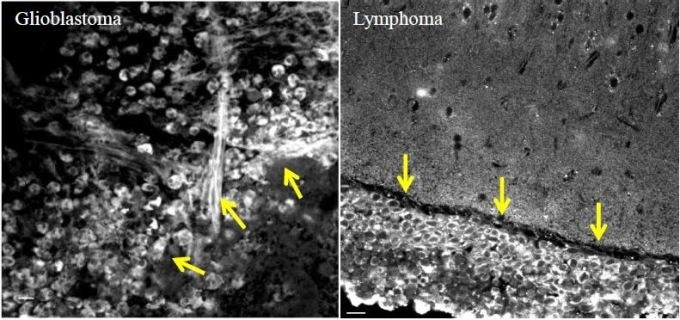Mar 24 2017
Neurosurgeons at The Barrow Neurological Institute (BNI), North America’s largest neurosurgical training program and scientists at The Arizona State University Biodesign Institute (ASU), in collaboration with Zeiss Microscopy are developing novel molecular nanoprobes and cutting-edge optical imaging techniques to provide immediate and specific diagnoses for cancer patients.

Sample Images: Immediate and specific diagnosis of two common brain tumors with vastly different treatment plans. Separate nanoprobes specific for glioblastoma (GBM) and lymphoma show many brightly staining tumor cells in the GBM biopsy and the characteristic circular staining pattern in the lymphoma biopsy. Tumor and brain margins (yellow arrows). Scale bars 20 μm.
Newly diagnosed cancer patients frequently undergo biopsy to determine their cancer type and subsequent treatment plans. Definitive diagnoses from these biopsies often require days to weeks to complete. This waiting period can prevent important changes in surgical treatments, increase patient anxiety, delay initiation of post-operative treatment plans, and prolong hospital stays. With these new advances, patients being evaluated for suspected cancers will no longer have to wait for their diagnoses, and physicians will have information for immediately implementing personalized treatment plans.
“Current intraoperative pathology techniques were not meeting the needs of patients. We were inspired by the rapid advances in molecular nanoprobe technology we were seeing in the lab, so we partnered with Dr. Hao Yan at ASU to make something that could help patients right away,” says Dr. Peter Nakaji, neurosurgeon at BNI and co-Principal Investigator on the project.
Initial experiments have shown that the new technology can make some diagnoses within minutes, which is fast enough for the neurosurgeon to make critical changes to the intraoperative plan to suit the patient’s particular disease.
Joseph Georges, DO, PhD, a neurosurgical resident at the Philadelphia College of Osteopathic Medicine (PCOM), Xiaowei Liu, PhD, a post-doctoral fellow at the Biodesign Institute, and Jennifer Eschbacher, MD, a neuropathologist at BNI have been working on this project since its inception seven years ago. They are excited that this collaborative effort between multiple biomedical institutes (including ASU, BNI, PCOM and the University of Arizona College of Medicine-Phoenix) may lead to novel clinical tools for helping cancer patients.